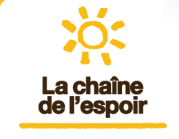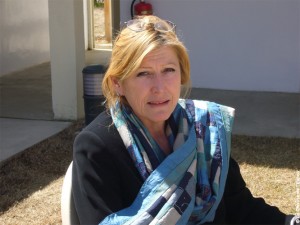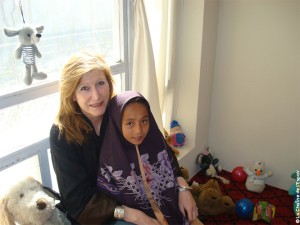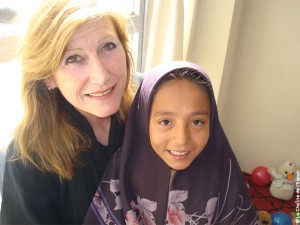La Chaîne de l’Espoir est une association humanitaire internationale dédiée à l’enfance et créée en 1988 par le professeur Alain Deloche.
TdF: Hello Kate, welcome on ‘Tonalités de Femmes’, How would you describe your principal activities, since you started your career?
My main area of work is now overseas, interspersed with periods at home. I have worked in several countries with multicultural teams, and have been involved in internally displaced camps, nutritional assessment and sanitation, prison activities both in Afghanistan and Northern Iraq which involved prisoner exchange, health and human rights activities. I have also been managerially responsible with practical hands on involvement in the setting up and running of seven hospitals in 3 countries, Afghanistan, Northern Iraq and Cambodia. Other activities I have been involved in have been the setting up of a Prosthetic and Rehabilitation Centre, Occupational health programme for war traumatised children, a social programme for widows and implementation of over 30 First aid posts and Public health Centres.
My work has also involved negotiation of Memorandums of Understanding at Ministerial level in different countries, budget reporting to Donors and strategic planning of different interventions.
TdF: What motivated you to create a children’s home in Kaboul? When you open the doors in 2008, what were your first actions?
I felt incredibly fortunate to be asked by La Chaîne de l’Espoir to initiate the Children’s project with the opportunity to work with children and families to provide really practical assistance and care, in a country that I love. My motivation for this area of work has remained with me for several years. I believe every effort, big and small is important to bring change in health inequalities world – wide.
It is a sad, but real fact that economic factors have a huge impact on this inequality of health, the Children’s project aims to assist vulnerable children who would otherwise not have the possibility for necessary specialized surgical treatment.
The first and most important action was to bring together the foundation of a team who could share ideas, experiences, health and cultural knowledge to develop the Project into a reality, which was to ensure we reached vulnerable children across 34 provinces.
To achieve this it was very important to establish good working contacts with the Ministry of Public Health, other organizations and also at a local provincial level. Once this was initiated we became the middle link in a strong referral chain. Referral of patient from the Provinces to the children’s house and from the project to the hospital for assessment and treatment.
Another very important — and ongoing action is to ensure a real home for children and their parents, the house is fun, quirky and colourful, a place for children to play, to interact and to express themselves which is vital to their overall recovery, both physically and psychologically.
TdF: In a normal day, how do you communicate with the children?
Every day we have children coming and going … so each day is a new experience… greeting the new kids and saying hello again to the patients and families who are on return visits for more treatment or follow up.
The house respects the cultural norms particularly as most of the families are from the remote areas. We have separate sitting and communal rooms for ladies and men …. The children usually decide where they will go themselves! Every morning at 7.30 after breakfast all the families are gathered with the children in the communal sitting rooms. There are no chairs but the Afghan cushions … Toshaks where everyone sits and waits their turn… it can be somewhat chaotic …with lots of children whizzing, playing and chatting with each other… however we eventually get some organization and another day starts !!!
Each child greets us with an outstretched hand and a “Salaam”…. a lovely start to the day….
Children are referred to us from every province and many come with their own different dialect or language, at times we have over 7 different languages spoken in the house…which sometimes needs a series of translators!!
However the children have no such problems … they are fluent in the universal language of kids..!!
The house is a real melting pot of different ethnicities such as Pashtu, Tajik, Hazara, Uzbek, Turkman … and many more … but the communication is made by friendship and a mutual bond of the parents whose primary concern is the welfare and well being of their children.
TdF: Do you have the opportunity to follow the children after they leave ‘La Maison des Enfants’?
Due to the complexity of their pathology many of the children are treated within the project for several months or even years, making return visits at reqular intervals for medication, or further surgery. Therefore the house becomes their second home, and they meet and greet old friends from the house and other provinces like family … and that includes us as the team… which is a lovely and rewarding experience.
It is not uncommon for parents whose children have finished treatment to contact us … by mobile phone, or by a message sent with another patient… just to say hello, or wish us well during religious festivals…at the same time sending news of their child’s progress.
Very sadly the reality of Afghanistan is that now travel to many provinces is very difficult due to security reasons, therefore our possibilities to travel and visit families and patients is much more restricted than previous.
Most of our visiting possibility is in Kabul province, or in the nearby provinces such as the Panjshir valley where we also have an education project of construction work and support of 5 schools. This necessitates frequent visits and follows up. It is on these occasions that we can visit the families in their homes, always being made welcome, they open their hearts and homes to us…it is always a joy to see the children … well, recovered and back in their own environment.
TdF: Please can you give us an example of one of the children you have helped and who has been able to rebuild his life again?
When reading this question so many children come to mind who have been assisted in different ways, whether it be life saving cardiac surgery, or complex orthopedic spinal surgery to prevent further deformity, or a realm of other pathologies which without surgery have consequent life debilitating or even life- threatening consequences.
One child that we found just by chance in 2008 was a young teenager of 14 years old, team member and I were carrying out an evaluation visit to the Panjshir for the school’s project. On this specific visit, as very often, we were surrounded by children all chattering and inquisitive as to why we were there.
There was one child who did not join the rest, but kept away from the group, it was a sunny and fairly warm day but his face covered up to over the nose with a scarf. We asked a local adult who was accompanying us what this young boys problem was… and were told in Dari ‘Lab Chock’ (Split lip. )
We found the father…who told us it was because of economic reasons his son had not had surgery to correct what was a marked Cleft lip and palate deformity.
It was clear to see that the boy Najibullah was very much affected both socially and psychologically by his appearance, and tragic to see how something that was easily treatable had impacted this child – his childhood, self esteem and ability to mix and communicate.
Najibullah did not attend school, did not mix with his peers, and was in many ways ostracized…
The father readily agreed to bring his son to Kabul to the Children’s project, but he didn’t really have much confidence that his son’s facial deformity could be resolved.
However he came with his son to Kabul to the Children’s project, where the boy was assessed and listed for surgery. Six weeks later Najibullah was admitted to hospital where he underwent the operative procedure of Repair of Cleft lip and Palate. The surgery time took one and a half hours, his hospital stay 4 days, the cost $600 —- – the result amazing and life changing !!!!
Najibullah had several months of follow up mainly regarding speech development, he did incredibly well and overcame years of speech impairment with determination and hard work. He started attending school the same year… and became “one of the gang “
We often see him during our visits to that area of the Panjshir, he always stops to say hello and have a chat, just to see his smile is such a reward – and very humbling, that this simple intervention could have made so much difference to a young life.
The motivation and flexibility of Kate with her ability to adapt into challenging and diverse situations,have been clearly recognised. Kate has been Awarded an MBE in the ‘Honours List 2002’ for services to nursing and public health overseas.










Merci pour cet entretien, l’opération commence fort ! Je souhaite à Kate de gagner et j’ai hâte de découvrir les autres Femmes de coeur !
I have met Kate many years ago for the first time in the north of Kenya. By coincidence I found her again in Afghanistan and had the great pleasure to work with and under her control for two years in Afghanistan.
It is extremely difficult to tell in a few words about this woman. She has an internal power and strength and an incredible energy to follow her ideals.
I have in those two years so many memories. Her activities in Afghanistan is not just her job, but it is her passion.
She can give special energy to almost everybody: expats and to the local society.
I think that her life goes through periods of deep disappointments, but always she knows to find the real track in her life and the Afghan society can be very happy to have this woman within their society.
I wish this woman many, many more fantastic years in her so beloved Afghanistan.
My warmest sympathy for her.
Merci pour cet article …
I was happy to find this web-site.I wanted to thanks for this wonderful read and so interesting interview!. I absolutely enjoying every little bit of it. Amazing woman!
Very good interview, i undoubtedly love this website, keep on it!